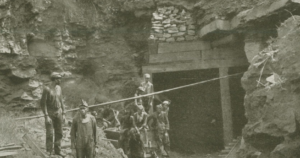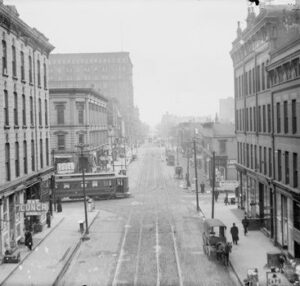The founder and long-time owner of Taylor Electric Company, Samuel “Sam” Taylor, was born in Montgomery, Alabama, on April 9, 1896, the son of Rufus and Martha Taylor. His father and two brothers, William and Martin, and later Sam himself, worked in the coal mines in Pratt City, Alabama, a notoriously rough company town near Birmingham, memorialized by Bertha “Chippie” Hill in the song “Pratt City Blues.”
In 1890, shortly after the United Mine Workers of America was founded, miners in the Birmingham area formed District 20 of the UMWA. The bi-racial union faced strikes and defeats, economic hardships, and racial manipulation. By 1908, when Sam was thirteen, a strike over a huge wage reduction was met with strikebreakers, National Guard troops, vicious race-baiting, and violence.

By 1917, Sam Taylor had married Clementina Smith, had two children, and was still working in the mines. According to Taylor’s family recollections, Sam Taylor left Alabama after shooting the man responsible for the lynching of his brother, Will. While public agencies at the time rarely kept track of lynchings, Birmingham newspapers describe the deaths of three Will Taylors in the Birmingham area in situations that could be called lynchings.
According to the U.S. Census, Taylor was in Chicago by 1920, but the records list him without a wife or children. Clementina died in Alabama shortly after the census was taken. After menial jobs as a laborer, Taylor began working with two Black electricians employed by the 8th Regiment U. S. Armory in Chicago. Following his taking a correspondence course, Taylor received his electrician’s license and began doing electrical work for neighbors, including Blue Star Auto, Greer College, and Chicago’s most notorious gangster, Al Capone. This work allowed him to create the Taylor Electric Company (TEC). His chief assistant was Charles Stewart, the teenage son of Sam’s domestic partner.

Taylor’s experience in the mines might have led him to expect union support. In Chicago, however, the trade unions, including the International Brotherhood of Electrical Workers, were all white and all-powerful. Taylor joined with other Black electricians and, with the help of Congressman Oscar DePriest, received Charter 9362, allowing them to form what was essentially a Black union. When Black activist A. Philip Randolph pressured President Franklin Roosevelt to desegregate defense industries, and IBEW 134 began using Charter 9362 members to meet race quotas. In 1943, Sam Taylor and Charles Stewart finally became members of IBEW 134.
In 1931, Taylor married Jessie Thompson. She died eleven years later but not before giving birth to three children who would become instrumental in the survival of TEC. His son, Rufus, joined the company in 1958 and, in 1969, took over operations jointly with his sister, Jessie Dinkins. Today, Taylor Electric is more than 100 years old and one of the most successful Black-owned businesses in the United States, generating annual receipts of 15 million dollars. The CEO and the COO are both Sam Taylor’s granddaughters.

